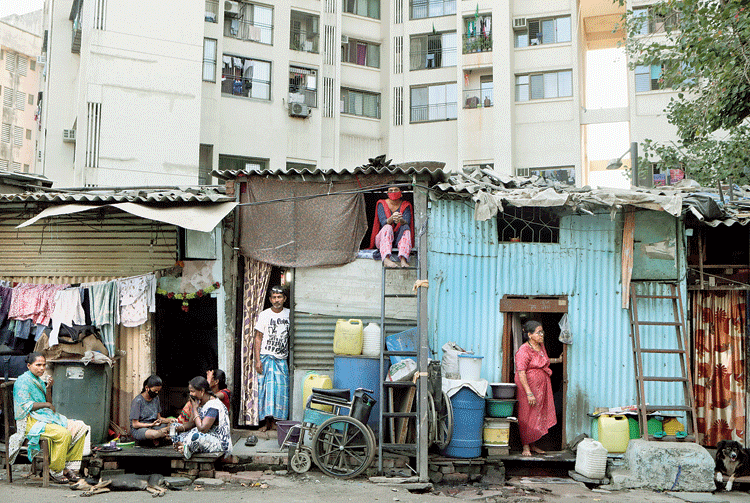Amid India’s growing coronavirus epidemic, Dharavi, a pocket of Mumbai, has achieved a steep decline in daily coronavirus cases through public health and community measures that doctors there believe hold lessons for cities across the country.
The Dharavi campaign driven by Mumbai’s health authorities, private practitioners, community volunteers and legislators has helped reduce the daily average new cases from 43 in May to 19 in the third week of June, the health ministry said.
Infectious disease specialists view Dharavi as a fantasyland even for SARS-COV-2, the virus that causes the coronavirus disease (Covid-19) and spreads easily from person-to-person.
The sprawling but congested locality marked by narrow lanes and hundreds of low-built houses has a population density of 227,136 persons per square-kilometre. Around 80 per cent of its people depend on community toilets and eight to 10 people live in households or hutments just 10ft by 10ft.
Such limitations in physical distancing made effective home quarantine impossible.
Local municipal authorities adopted a standard public health countermeasure — tracing, tracking, testing suspects and treating lab-confirmed Covid-19 cases.
The local authorities sought the help of private practitioners who screened 47,000 people, while the municipal health workers screened over 476,000 people.
“It wasn’t easy at the start — in April, there was a fear even among doctors,” said Shivkumar Utture, a surgeon and member of the Mahim-Dharavi Medical Practitioners Association. “At the start in April, we all had concerns about whether we’d be able to control the outbreak — but then things changed.”
The health authorities provided personal protective equipment to all private practitioners and training in examining patients through the gear and disposing it. Every week, authorities hand over a seven-day supply of PPEs to doctors.
“We started with two or three, we now have 200 private practitioners across the the area,” Utture said.
Their “screening clinics” examine high-risk category people such as the elderly and those with underlying health disorders. Over 8,200 senior citizens have been sent to temporary quarantine centres to reduce their risk of catching the infection.
The Union health ministry estimates that over 548,000 people have been screened in Dharavi so far, many through mobile vans.
The authorities sent only patients with severe disease to public and private hospitals and turned local schools, marriage halls and sports complexes into temporary quarantine zones for those who needed to be separated from Dharavi, a high-risk zone for Covid-19.
Community kitchens provided breakfast, lunch and dinner to those housed in the quarantine centres that also had round-the-clock access to medical services. A key feature of the containment strategy was ensuring uninterrupted supply of food and other essential items to the community.
Ninety per cent of the patients were treated in Dharavi itself, the ministry said. Local legislators, corporators and Members of Parliament provided food and groceries to local households in need.
The infection doubling time in Dharavi has stretched from 18 days in April to 43 days in May to 80 days in June, Utture said.
“Dharavi and Mumbai have to be commended for their aggressive testing, tracing, and isolation to control the spread,” said Shahid Jameel, a senior virologist and head of the Wellcome Trust-DBT India Alliance, an India-UK research partnership.
Utture said Mumbai’s health authorities are trying to replicate the actions taken in Dharavi in other congested localities in the city. “As the epidemic grows in India, these measures could serve as models for other crowded cities too,” he said.
India on Monday recorded 14,821 fresh Covid-19 cases, raising the total number of cases to 425,282 of whom 174,387 are under medical supervision, 237,196 have recovered and 13,699 have died.










